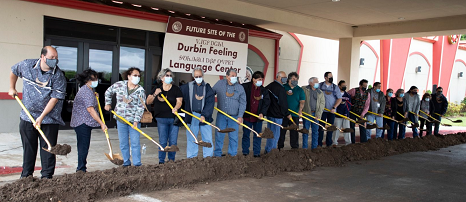
- Details
- By Chuck Hoskin Jr
The Cherokee language has always been the heart and soul of our tribe. Our language contains knowledge and ways of thinking that can never be fully captured in translation. All of our accomplishments in health care, education and economic development could never make up for the loss if we allow our language to perish.
That is why we are working aggressively to save our language. Fortunately, a permanent place to develop Cherokee speakers and foster Cherokee language learning is closer to fruition. Ground was recently broken for the Durbin Feeling Language Center, a 50,000-square-foot, state-of-the-art facility that will be housed in the former Cherokee Casino Tahlequah.
In a little over a year, the center will become the long-term home of the Cherokee Language Department, which is comprised of more than a dozen unique programs for Cherokee language perpetuation. The former casino site will be expanded and modified to include a cafeteria, gymnasium, sound booth and vault for document storage. For the first time in history, all of these essential programs will be under one roof.
The campus will also soon include homes for speakers. Five dwellings are currently under construction adjacent to the center, and plans are underway for more homes for elders and families involved with the language programs. Cherokee-speaking elders will be given a safe and comfortable place to live, and Cherokee students will have much greater opportunity to interact with and learn from them.
These infrastructure developments are only possible because of the passage of the Durbin Feeling Preservation Act, an investment of $16 million by the Council of the Cherokee Nation to preserve our language and culture. Five million dollars were specifically earmarked for the language hub.
The Durbin Feeling Act is named after the greatest modern contributor to the preservation of the Cherokee language. Durbin dedicated his life to preserving the Cherokee language for future generations, doing more for our language than anyone since Sequoyah. He wrote the Cherokee dictionary, added Cherokee syllabary to a word processor in the 1980s, developed volumes of Cherokee teaching materials and began the process to put the Cherokee language on Unicode. Today, that technology allows the syllabary to be used on smartphones.
We honor his legacy by doing this work in his name.
Cherokee heroes like Durbin are important not only for the work they do in their lifetimes, but because they inspire us to continue that work after they have passed. Durbin’s vision was that our Cherokee language efforts would be more than just inside classrooms and offices. He foresaw how language preservation could build a powerful sense of community. That's what we're attempting to achieve today.

There are only about 2,000 first-language Cherokee speakers alive today, which is why Deputy Chief Bryan Warner and I made preserving the Cherokee language a top priority from the outset of our administration. As we were making these historic investments in the Cherokee language, the most devastating health crisis in our lifetimes hit Cherokee Nation, and our Cherokee speakers were among the most vulnerable. The median age of a first-language Cherokee speaker is over 70 years old, and we sadly lost more than 50 speakers to COVID-19.
During the worst of the pandemic, we made concentrated efforts to support our speakers, providing food assistance, telehealth services, utility bill assistance and direct elder assistance payments. When we received our first doses of the COVID-19 vaccine, I immediately prioritized our Cherokee speakers.
I am proud of the investments we made in our language at Cherokee Nation, and I am eager to see Congress make a similar investment throughout the country. Later this month I will testify before the U.S. Senate Committee on Indian Affairs and endorse a bill that is also named for Durbin Feeling.
It will ensure that the federal government is upholding its promises and policies designed to preserve Native languages. The nationwide survey it produces will help guide future investments to ensure that Native languages are preserved for generations to come. Additionally, the act would direct President Biden to review federal agencies' compliance with requirements of the Native American Language Act.
Preserving the Cherokee language is preserving Cherokee identity. Speaking Cherokee allows us to pass along traditional Cherokee knowledge and values to our children and grandchildren. Even though I am not a Cherokee language speaker, I know how urgent it is to act swiftly and decisively. I want my grandchildren and future generations to grow up in a United States where Native languages are revered as the unique cultural treasures that they are.
Chuck Hoskin, Jr. is the principal chief of the Cherokee Nation.
More Stories Like This
The SAVE America Act Threatens Native Voting Rights — We Must Fight BackThe Presidential Election of 1789
Cherokee Nation: Telling the Full Story During Black History Month
Jesse Jackson Changed Politics for the Better
Native News Online at 15: Humble Beginnings, Unwavering Mission
Help us defend tribal sovereignty.
At Native News Online, our mission is rooted in telling the stories that strengthen sovereignty and uplift Indigenous voices — not just at year’s end, but every single day.
Because of your generosity last year, we were able to keep our reporters on the ground in tribal communities, at national gatherings and in the halls of Congress — covering the issues that matter most to Indian Country: sovereignty, culture, education, health and economic opportunity.
That support sustained us through a tough year in 2025. Now, as we look to the year ahead, we need your help right now to ensure warrior journalism remains strong — reporting that defends tribal sovereignty, amplifies Native truth, and holds power accountable.
 The stakes couldn't be higher. Your support keeps Native voices heard, Native stories told and Native sovereignty defended.
The stakes couldn't be higher. Your support keeps Native voices heard, Native stories told and Native sovereignty defended.
Stand with Warrior Journalism today.
Levi Rickert (Potawatomi), Editor & Publisher
